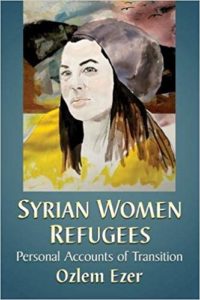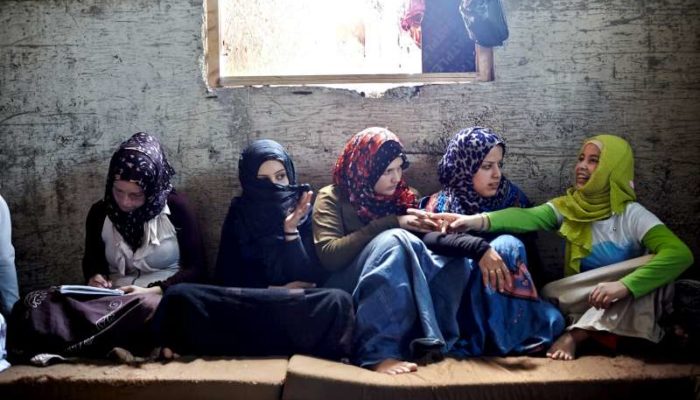Book Review: ‘Syrian Women Refugees: Personal Accounts of Transition’ – Dr. Ozlem Ezer
“Journeys come in many forms: planned, unplanned, short, long, tiring, comforting, illuminating, legal, undocumented, on foot, by boat, with or without someone waiting at the other end” (Ezer, 2019: 1).”
Dr Ozlem Ezer has worked and travelled through several different countries as a scholar, writer, educator, translator, and activist. She specialises in women’s and gender issues, placing the voices and experiences of the marginalised at the centre of her work. Her timely and highly poignant book ‘Syrian Women Refugees: Personal Accounts of Transition’ provides a firsthand account of the lives of Syrian women who became displaced and sought a new home as a result of the Syrian war, which broke out in 2011. The stories are based on original interviews conducted with nine women, aged 26 to 52, from Aleppo, Damascus, Daraa, Deir, Az-Zor, Homs, and Latakia. These women are still in transition in Canada, Germany, Greece, and Turkey, and many have moved multiple times before being resettled.
 Ezer explores these women’s journeys, both during and following displacement, with respect to their experiences with education, family and loved ones, treasured childhood memories, religion and cultural practices. Each narrative reveals how these women understand and navigate the concept of the self as they access their memories and attempt reconciliation within various complex cultural, familial, and international contexts.
Ezer explores these women’s journeys, both during and following displacement, with respect to their experiences with education, family and loved ones, treasured childhood memories, religion and cultural practices. Each narrative reveals how these women understand and navigate the concept of the self as they access their memories and attempt reconciliation within various complex cultural, familial, and international contexts.
The book starts with Rose, a 52-year old Kurdish Yazidi woman who was born in Damascus, but grew up in Aleppo. She is an educator (with a Bachelor of Arts in English literature) and is married with three children. Rose sought asylum in Germany following the death of her son.
We are then told the story of Lutfia, a 47-year-old homemaker from Dala. Also married with three children, Lutfia resettled in Istanbul and currently assists with the education of Syrian children through the non-government sector. Next, we explore the experiences of Muzna, who speaks of her two brothers, her Bachelor of Arts in French linguistics and how she fled Aleppo, ultimately resettling in Canada where she now works as a human rights activist.
Muzna’s story is followed by that of Sama, a 28-year-old woman from Damascus with a degree in translation, who, after living in Turkey and Lebanon, resettled in Germany, where she has been reunited with her brothers. She is now preparing for her new life in Germany with her Syrian fiancé. Emilia is 28 years old and was raised alongside four older brothers in Homs by their single mother. After leaving Syria in 2011, Emilia spent time in Dubai, Jordan, Lebanon, and Yemen before resettling in Canada in 2014. She is now attending university, where she double majors in psychology and political science.
Next is the story of Zizinia. At 38 years of age, she is a single mother of two daughters with a degree in economics. Zizinia initially sought asylum in the United States in 2012, but later resettled in Turkey so she could be reunited with her children. We are then told the story of Leila, who is 26 years old and moved to Damascus from Deir Ez-Zor in 2008. Leila was studying environmental engineering in Aleppo when the war began and subsequently had to transfer to Istanbul University in 2013. Bidaa was born in Aleppo, where she practiced law prior to seeking asylum in Athens in 2016. She now gives Arabic lessons to children from Arab countries who have resettled in Greece and works to dismantle stereotypes about Islam.
Lastly, Ezer tells the story of Sara, a 26-year-old self-proclaimed atheist and bisexual from Latakia. Sara is the eldest of four siblings and has a degree in pharmacy. She fled Syria to Istanbul in 2015, but has since resettled in Athens, Greece. After six-months of homelessness, Sara started working for a well-known international non-government agency where she now advocates for the rights of other marginalised communities. In her own words: “I don’t like this idea of “belonging”… In the end, I am a human being and I can adapt to any community. In the end, I’m Syrian, but I don’t like to stress that. I am a human being. I feel I belong to many communities” (Sara’s Story, page 131).
Each of these narratives allows readers to gain insight into the wider contexts of the socio-historical framework underlying the women’s stories. By applying an oral historian approach, Ezer thoughtfully acknowledges that Syrian women refugees are continuously drawing upon their current circumstances when interpreting their pasts. Through these powerful stories, Ezer critically explores the concept of “womanhood”, opting instead to present all nine narratives through the plural lens of “womanhoods”, which allows for greater appreciation of the complex and unique nature of each woman’s experiences.
Most importantly, this the book puts a human face on the refugee experience:
“I want readers to realise that we can become a refugee through any sudden turn of events… With this realization, we can begin to perceive their stories from a fuller perspective” (Ezer, 2019: 3).”
Ezer exercises utmost care and empathy with all nine stories in this book, reflecting on her own relationships with the women throughout her writing. Her feminist position also means that the book avoids sensationalising the experiences of these women, who are never presented merely as research subjects without autonomy – instead, they are positioned through Ezer’s own connection to their experiences, with their voices shaping the stories.
Ezer’s important work offers a moving and highly insightful glance into the lives of Syrian women experiencing displacement, highlighting their tremendous resilience and survival in the face of unthinkable loss and trauma.
